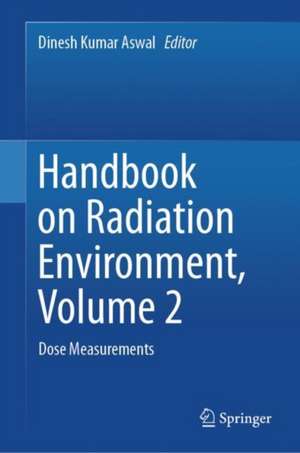Handbook on Radiation Environment, Volume 2: Dose Measurements
Editat de Dinesh Kumar Aswalen Limba Engleză Hardback – 18 mai 2024
Preț: 1156.95 lei
Preț vechi: 1522.30 lei
-24% Nou
Puncte Express: 1735
Preț estimativ în valută:
221.40€ • 229.75$ • 185.06£
221.40€ • 229.75$ • 185.06£
Carte tipărită la comandă
Livrare economică 13-19 martie
Preluare comenzi: 021 569.72.76
Specificații
ISBN-13: 9789819727988
ISBN-10: 9819727987
Ilustrații: XIX, 773 p. 284 illus., 241 illus. in color.
Dimensiuni: 155 x 235 mm
Ediția:2024
Editura: Springer Nature Singapore
Colecția Springer
Locul publicării:Singapore, Singapore
ISBN-10: 9819727987
Ilustrații: XIX, 773 p. 284 illus., 241 illus. in color.
Dimensiuni: 155 x 235 mm
Ediția:2024
Editura: Springer Nature Singapore
Colecția Springer
Locul publicării:Singapore, Singapore
Cuprins
Ionizing Radiation and Radiation Protection.- Interaction of Ionizing Radiation with Matter.- Radiation Environment in Nuclear Fuel Cycle Facilities.- Radiation Environment in Medical Facilities.- Occupational and Patient Doses in Medical Facilities.- Radiation Environment in Industrial and Research Facilities.- Radiation Environment in Particle Accelerator Facilities.- Detectors and Reader Systems for External Dose Monitoring.- Monitoring of External Gamma and Beta Exposures.- Monitoring of External Neutron Exposures.- Space Radiation Dosimetry.- Retrospective Dosimetry.- Biological Retrospective Dosimetry.- Introduction to Internal Dosimetry.- Biokientics of Radionuclides.
Notă biografică
Dr. Dinesh Kumar Aswal holds prominent roles within the Trombay Council (TC) at the Bhabha Atomic Research Center (BARC), serving as its senior member. He also assumes key positions such as Director of the Health Safety and Environment Group (HS&EG), Associate Director of the Medical Group, and Director of the National Radiation Emergency Response under the Department of Atomic Energy, Government of India. His responsibilities encompass safeguarding nuclear and radiological safety across the entire nuclear fuel cycle. Internationally renowned for his scientific expertise, administrative prowess, and diplomatic acumen, Dr. Aswal has an extensive list of accomplishments. He has edited nine books, authored over 50 book chapters, filed nine patents, and published more than 500 journal and conference papers, with an impressive H-index of 56 and over 11800 citations. Dr. Aswal's leadership extends beyond his scientific endeavors. He has held administrative positions in prestigious national institutes, including Director of the National Physical Laboratory (CSIR-NPL) in New Delhi, Director of the Central Electronics Engineering Research Institute (CEERI) in Pilani, and Director of the Science, Technology, and Development Studies (CSIR-NISTADS) in New Delhi. He has also chaired the National Accreditation Board for Testing and Calibration Laboratories (NABL) and served as Secretary of the Atomic Energy Education Society (AEES) in Mumbai. His notable achievements include implementing the redefined International System of Units (SI) based on fundamental and atomic constants and establishing the National Atomic Clock Ensemble to generate Indian Standard Time (IST), renowned for its exceptional accuracy.
Furthermore, Dr. Aswal has contributed significantly to India's nuclear program, developing key technologies such as radiation detectors and hydrogen sensors. He has also pioneered technologies to address societal challenges, including recycling plastic waste, measuring air pollution and enhancing security features for currency notes. Internationally, he has been invited to deliver lectures and engage in collaborative research at esteemed institutions across Japan, France, Germany, Israel, the United States, and more. He is a Fellow of the International Association of Advanced Materials (FIAAM), Sweden, and the National Academy of Sciences, India (FNASc), among other prestigious honors. Additionally, he serves as Chairman or member of various national committees of the Government of India, further cementing his impact and influence in the scientific community.
Furthermore, Dr. Aswal has contributed significantly to India's nuclear program, developing key technologies such as radiation detectors and hydrogen sensors. He has also pioneered technologies to address societal challenges, including recycling plastic waste, measuring air pollution and enhancing security features for currency notes. Internationally, he has been invited to deliver lectures and engage in collaborative research at esteemed institutions across Japan, France, Germany, Israel, the United States, and more. He is a Fellow of the International Association of Advanced Materials (FIAAM), Sweden, and the National Academy of Sciences, India (FNASc), among other prestigious honors. Additionally, he serves as Chairman or member of various national committees of the Government of India, further cementing his impact and influence in the scientific community.
Textul de pe ultima copertă
The handbook aims to provide a comprehensive resource for understanding ionizing radiation dosimetry, catering to experts, policymakers, and interested readers. The content of the handbook is focused on two two main aspects of dose measurements: external dosimetry and internal dosimetry. The section on external dosimetry covers fundamental principles and discusses monitoring techniques across various environments, such as nuclear, industrial, research, and medical facilities. It also covers advanced topics like Bayesian inference and retrospective dosimetry. The internal dosimetry section explores radionuclide biokinetics, simulation techniques, dose evaluation, and monitoring methods. Specific scenarios, such as radon inhalation and off-normal conditions, are addressed, highlighting the importance of precision and intervention. The handbook serves as a comprehensive resource for students, academicians, scientists, engineers, and policymakers interested in seeking an in-depth knowledge of radiation dose measurements and its multi-faceted aspects in protecting human health and the environment.
Caracteristici
Covers external and internal dosimetry, fundamental principles, advanced topics, and scenarios Discusses detailed dosimetry methods across nuclear, industrial, research, and medical environments Includes Bayesian inference, retrospective dosimetry, and radionuclide biokinetics for thorough evaluation
